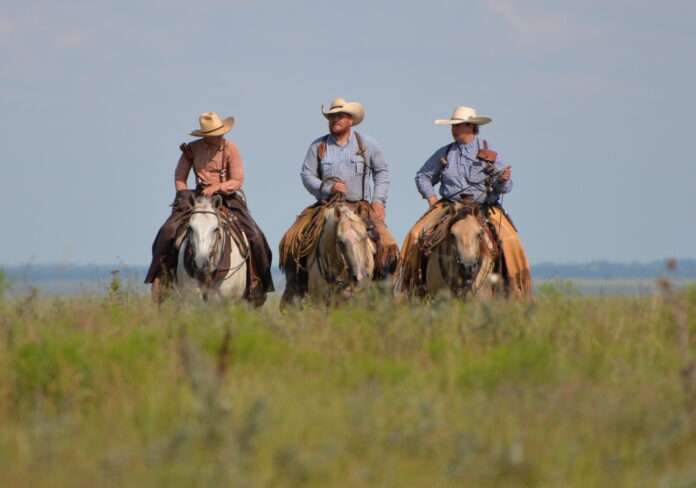Josh and Gwen Hoy’s Flying W Ranch of Cedar Point has been selected as the recipient of the 2020 Kansas Leopold Conservation Award®.
Given in honor of renowned conservationist Aldo Leopold, the award recognizes those who inspire others with their dedication to land, water and wildlife resources in their care. The Hoys were recently presented with $10,000 and a crystal award at a special ceremony at their ranch near Cedar Point.
In Kansas the award is presented annually by Sand County Foundation, American Farmland Trust, Kansas Association of Conservation Districts and the Ranchland Trust of Kansas.
Unconventional ranching on protected prairie is how Josh and Gwen Hoy describe what they do on Flying W Ranch, a bison and beef cattle ranch on the tallgrass prairie of the Kansas Flint Hills. The Hoys receive $10,000 and a crystal award for being selected for the award.
“The Hoy family epitomize the land ethic that Aldo Leopold wrote about. Their public outreach ensures their conservation success stretches far beyond their property line,” said Dan Meyerhoff, Kansas Association of Conservation Districts Executive Director.
“Congratulations to the Hoy family. Their dedication to conservation can be seen by their ranch stewardship practices. They also have been great advocates for the cause sharing the story of ranchland conservation with the public,” said Chelsea Good, Ranchland Trust of Kansas Vice Chairman.
“Recipients of this award are real life examples of conservation-minded agriculture,” said Kevin McAleese, Sand County Foundation President and Chief Executive Officer. “These hard-working families are essential to our environment, food system and rural economy.”
“We are pleased to present this award to Josh and Gwen Hoy for their outstanding application of innovative grazing practices along with their dedication to the land, soil and livestock they steward,” said John Piotti, American Farmland Trust President and Chief Executive Officer. “At AFT we believe that conservation in agriculture requires a focus on the land, the practices and the people. The Leopold Conservation Award recognizes the integral role of all three.”
Earlier this year, Kansas landowners were encouraged to apply (or be nominated) for the award. Applications were reviewed by an independent panel of agricultural and conservation leaders. Among the many outstanding Kansas landowners nominated for the award were finalists: Vance and Louise Ehmke of Healy in Lane County, and Dwane Roth of Manhattan in Riley County.
In 2015 the first Kansas Leopold Conservation Award was presented to Sproul Ranch of Sedan. Last year’s recipient was Ted Alexander of Sun City.
The Leopold Conservation Award in Kansas is made possible thanks to the generous support of American Farmland Trust, Sand County Foundation, Kansas Association of Conservation Districts, Ranchland Trust of Kansas, Evergy, Farm Credit Associations of Kansas, ITC Great Plains, Kansas Department of Agriculture (Division of Conservation), Kansas Department of Wildlife, Parks and Tourism; Kansas Forest Service, McDonald’s, The Nature Conservancy, USDA-Natural Resources Conservation Service and a Kansas Leopold Conservation Award recipient.
In his influential 1949 book, A Sand County Almanac, Leopold called for an ethical relationship between people and the land they own and manage, which he called “an evolutionary possibility and an ecological necessity.”
Sand County Foundation presents the Leopold Conservation Award to private landowners in 20 states for extraordinary achievement in voluntary conservation. For more information, visit www.leopoldconservationaward.org.
ABOUT FLYING W RANCH & THE HOY FAMILY
Their peers call them visionaries for how they ranch in sync with nature, thanks to innovative conservation practices.
Josh and Gwen brought their own deep agricultural roots to create a productive and sustainable business on 7,000 acres. The Hoys take pleasure in understanding how livestock and wildlife can flourish while improving soil health and water quality. They are passing their intense awareness and appreciation of the land to their daughter, Josie.
After removing miles of fence within their ranch, they adopted an “instinctive migratory” grazing method for their livestock. It brings grass and forbs back to damaged areas, and protects riparian areas. In addition to grazing techniques, they control woody and invasive plants by patch burning and mechanical removal, instead of herbicides.
An Audubon Bird Friendly Ranch label may soon appear on the Hoy’s beef to inform consumers that grazing practices were used that promote grassland stewardship.
With conservation easements on all land they own or manage, the Hoys’ impact extends beyond their ranch gate. Collaboration with neighbors has put 4,000 contiguous acres of formerly-farmed ground in the Coyne Creek watershed back into native prairie or managed pasture.
Their advocacy has included holding unique events at the ranch. To promote the ecological benefits of controlled burns they’ve hosted a meal, live music and wagon rides before guests watch an evening prairie burn. The Kansas City Symphony has performed on their ranch at sundown to heighten appreciation of the tallgrass prairie.
Welcoming guests to the ranch is nothing new for the Hoys. For years they’ve welcomed guests to experience cowboy culture at the ranch. An authentic 1880s chuck wagon and a professional kitchen offers guests everything from rustic fare to gourmet dining. This ‘guest ranching’ agritourism business has allowed them to reduce debt, acquire land, educate the public, and invest in conservation. With the COVID-19 public health crisis forcing them to stop hosting guests, they’ll refocus their efforts with more marketing of their sustainably-raised, grass-fed beef.
Resilience is the real story of Flying W Ranch.
Josh founded the ranch with his cousin Warren Kruse in 1996. Tragedy struck in 2004 when Warren and his mother (Josh’s aunt) were killed in a plane crash. Hardship followed, as the unexpected loss set back many of the projects they were working on. The conservation easements that were placed on the property are the result of many years of effort and a testament to Warren’s legacy and vision.
Late last year a wildfire spurred by high winds burned the Hoy’s home and business records. Starting over after such a loss once again felt daunting. However, they have preserved and are using conservation principles while building their new house.
Just as the tallgrass prairie has the natural resiliency to come back after a controlled burn, it’s clear that whatever comes their way, this family is committed to living their conservation ethic.
# # #
LEOPOLD CONSERVATION AWARD PROGRAM
The Leopold Conservation Award is a competitive award that recognizes landowner achievement in voluntary conservation. Sand County Foundation presents the award in California, Colorado, Kansas, Kentucky, Missouri, Montana, Nebraska, New York, North Dakota, Oklahoma, Pennsylvania, South Dakota, Texas, Utah, Wisconsin, and in New England (Connecticut, Maine, Massachusetts, New Hampshire, Rhode Island and Vermont). www.leopoldconservationaward.org
SAND COUNTY FOUNDATION
Sand County Foundation inspires and enables a growing number of private landowners to ethically manage natural resources in their care, so future generations have clean and abundant water, healthy soil to support agriculture and forestry, plentiful habitat for wildlife and opportunities for outdoor recreation. www.sandcountyfoundation.org
AMERICAN FARMLAND TRUST
American Farmland Trust is the only national organization that takes a holistic approach to agriculture, focusing on the land itself, the agricultural practices used on that land, and the farmers and ranchers who do the work. AFT launched the conservation agriculture movement and continues to raise public awareness through its No Farms, No Food message. Since its founding in 1980, AFT has helped permanently protect over 6.5 million acres of agricultural lands, advanced environmentally sound farming practices on millions of additional acres, and supported thousands of farm families. www.farmland.org
KANSAS ASSOCIATION OF CONSERVATION DISTRICTS
The Kansas Association of Conservation Districts is a voluntary, non-governmental, non-profit, incorporated organization composed of members from the conservation districts located throughout Kansas’ 105 counties. Through partnerships with federal, state and local entities, the Kansas Association of Conservation Districts has brought together groups that share the common goal of wise and efficient conservation practices that protect Kansas’ natural resources. The Kansas Association of Conservation Districts promotes and supports the establishment of programs dedicated to conservation and the organized development of Kansas land, water and related resources. www.kacdnet.org
RANCHLAND TRUST OF KANSAS
The Ranchland Trust of Kansas is a private, non-profit organization founded by members of the Kansas Livestock Association in 2003. The organization was created to provide assistance to rancher and landowners who desire to conserve their land with conservation easements. Guided by their mission to preserve Kansas’ ranching heritage and open spaces for future generations through the conservation of working landscapes, the Ranchland Trust of Kansas values a commitment to conservation, respect for private landownership, integrity, organizational excellence and collaboration with those who share their values. The Ranchland Trust of Kansas remains an affiliate of the Kansas Livestock Association. www.ranchlandtrustofkansas.org
If you would rather not receive future communications from The Sand County Foundation Inc, let us know by clicking here.
The Sand County Foundation Inc, 131. W Wilson St. Suite 610, Madison, WI 53703 United States
MEDIA CONTACT:
Casey Langan, Sand County Foundation
608.663.4605 ext. 32, [email protected]





